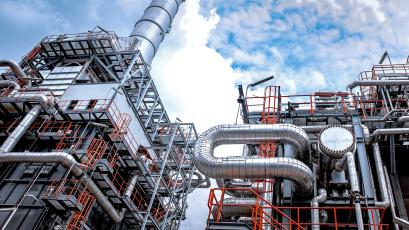Visions of a more sustainable and tech-enabled future dominated the agenda at the American Fuel & Petrochemical Manufacturers’ 117th annual meeting in San Antonio last week. Between sessions on virtual reality enhancing safety, and the outlook for liquid transportation fuels amid ubiquitous policy proposals to subsidize electric vehicles, the conference tackled some of the biggest issues refiners and petrochemical makers face today and will be confronting in the months and years ahead. Insights from veteran journalists, former and current policymakers, a Pulitzer Prize-winning historian, and other experts left no doubt that the current social and political landscapes are evolving — and fast. Fuel and petrochemical sector leaders were eager to report how they are adapting to sustain their business for the long term. Below are five trends that emerged from the conference to track in the coming year.

1. New technologies are advancing safety and efficiency. Virtual reality is proving its value beyond gaming. As companies work to recruit a younger (and tech-savvy) workforce, immersive-learning headsets and custom VR experiences are being used by some fuel and petrochemical manufacturers to improve worker training. With the technology, employees can practice detailed work or rare scenarios repeatedly, becoming familiar with equipment and processes before they step onto a facility site, laying a strong foundation for safer operations. Companies are also innovating with artificial intelligence in data collection and analysis.
“AI doesn’t do your thinking for you,” explained Scott Kimbleton, cognitive solutions lead for IBM, “it does your research for you so you can think better.”
Harnessing the potential of AI could deliver even better outcomes across two industries already renowned for efficiency.
2. Liquid fuels are essential to the future of transportation — and a new gasoline formulation could deliver major environmental benefits. Vehicle buyers in the United States continue to choose options that run on affordable, reliable and readily available liquid fuels like gasoline and diesel — automotive-market experts don’t anticipate that changing anytime soon. As automakers struggle to reach increasingly challenging emissions targets, and EV sales continue to lag, refiners are supporting innovative solutions to improve fuel economy, like the introduction of a 95-RON octane specification for gasoline, accompanied by an end to the Renewable Fuel Standard (RFS). This could deliver the environmental equivalent of putting 700,000 EVs on the road each year. According to AFPM President and CEO Chet Thompson, this solution would be “a path forward that works for everyone,” including automakers, consumers, refiners and producers of ethanol — a valuable source of octane.
As was noted during a discussion on the future of transportation including representatives from Flint Hills Resources and General Motors, the guiding principle for transportation policy should be to promote affordable, reliable, convenient mobility options for consumers — especially those with limited means.
3. As detractors become increasingly brazen, fuel and petrochemical makers must adapt their message to sustain their business. As the “keep it in the ground” movement, Green New Deal and similar efforts increasingly flood the public discourse with calls to phase out fossil fuels, the burden is on fuel and petrochemical manufacturers — and others in oil, gas and related industries — to elevate the immense value of their products.
In his keynote speech, Marathon Petroleum Corporation President and CEO Gary Heminger pinpointed critical privileges enabled by affordable fuels and petrochemicals that have benefited U.S. society immeasurably — from highly effective first-responder services; to efficient, abundant agriculture; to the delivery of fresh foods hundreds of miles from farms; to low-cost energy. These pivotal advantages and countless others would be pushed out of reach for millions in the United States and across the globe if the objectives of anti-fossil fuel advocates are realized.
Industry leaders echoed Heminger’s remarks at a CEO panel on business sustainability, stressing the need for fuel and petrochemical makers to evolve how they talk about their work and proactively tout the not only the benefits they bring society but also their contributions to a cleaner environment.
“We have an opportunity to work in these communities [where we operate],” said one executive. “It’s not a God-given right. We want people to be proud to work in this industry. We’ve got to change the narrative going forward.”

4. Investors want a diverse workforce — and know the benefits it delivers. Diverse hiring has long been a priority for many companies but increasingly, finding solutions to accelerate diversity and improve inclusion practices is being done with board-level involvement, not just within human resources departments.
“Investors are using diversity as a lens through which they assess a company’s sustainability,” said Julia Reinhart, senior vice president, human resources & administration for Valero Energy Corporation. “Unless you have sponsorship and leadership from the C-suite and board of directors, things won’t improve.”
In an EY survey on diversity in the oil and gas industry from January 2019, 61 percent of respondents said they “recognize that gender diversity improves financial business performance.” The survey report cited a Peterson Institute for International Economics report revealing that women leaders can add 6 percent to a company’s bottom line.
Where building and securing the future workforce is concerned, industry leaders are keenly aware that employees — both current and prospective — expect companies to be good neighbors locally and also to contribute toward solving broader societal challenges. Whether innovating water treatment processes at facilities, promoting entrepreneurship around the world or re-engineering plastics to tackle global waste, employees expect these industries to lead.
5. The environmental footprint of the industries continues to shrink, even as capacity and output increase. While many leaders mentioned the intersection of manufacturing and the environment, it was perhaps best summarized by AFPM President and CEO Chet Thompson:
“Over the last three decades we’ve reduced our emissions by 70 percent, while at the same time our refining capacity has grown by more than 20 percent, our nation’s GDP has grown by 200 percent, our population by 30 percent, energy consumption by 15 percent, and vehicle miles traveled by 40 percent,” said Thompson of petrochemical and fuel manufacturers.
Beyond “doing more with less,” U.S. refiners are also creating cleaner fuels. Having already lowered the sulfur content of gasoline and diesel by 90 percent, said Thompson, “next year, we will be providing the world with ultra-low sulfur marine fuel.” With the implementation of the International Maritime Organization’s 2020 sulfur standards on January 1, 2020— which lower the allowable amount of sulfur in marine fuel from 3.5 percent to .5 percent — U.S. refiners will be well-positioned to supply cleaner fuel to the world and improve air quality across the globe.


